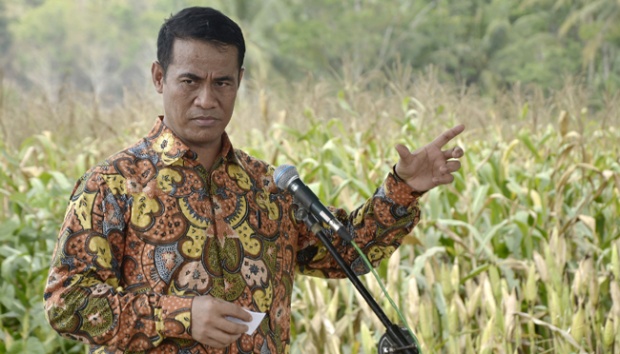Agriculture Minister Amran Sulaiman No need to import rice, yet
11 November 2015 14:16 WIB

TEMPO.CO, Jakarta - Indonesia once declared itself self-sufficient in food and even exported rice, back in 1984. Today, we are still grappling with the problem. Somehow, the rice issue, then and now, has never been settled. Issues from the high cost of production to the differences in the harvest numbers to the decision whether to import not are strongly debated within the sector. Agriculture Minister Amran Sulaiman, for example, has always insisted that the supply of domestically produced rice is secure. "No need to import rice yet," he told Tempo reporter Pribadi Wicaksono in Yogyakarta, last week.
* * * *
Just how much is rice production in Indonesia?
There's been an increase in productivity of about 4.5 million tons, better than in the previous years. Last year, it was 70 million tons. Now, it stands at 74.5 million tons.
How about the plan to open up new rice fields?
Next year, we plan to open up 200,000 hectares of new fields. Today, we are preparing 20,000 hectares in Irian Jaya (sic) and Sumatra. Yes, we have problems like the land transformation process, but we have mapped it out and the problem is currently being resolved.
President Joko Widodo once promised to build more irrigation dykes. What's being done about irrigation?
Not dams, but irrigation canals. The President has programmed 3 million hectares for a period of three years for this purpose. But our target is to complete it in one year's time. As for funding, 2.6 million hectares of land will be for tertiary irrigation, using state budget funds and 700,000 hectares to be funded by the Special Funds Allocation (DAK).
Different government agencies don't seem to agree on the data of rice production and demand, can you explain?
Maybe it's because the time and place of data collection were different. But the first point of reference remains the (data of) the BPS (Central Bureau of Statistics). Even the budget refers to the BPS. If there are differences on production numbers, they're very small.
Is it true the government has asked Bulog to import one million tons of rice from Vietnam?
That's allegedly, and even that would be to fill reserves. Reserves will not be lowered if the core players are not in trouble. Yes, we have some reserve rice from Vietnam, but it hasn't been delivered yet. In any case, it's started to rain in some areas. The price of rice in Cipinang has also gone down, to about Rp8,700 per kilogram of the medium quality type. Supplies to Cipinang will also go up. Usually it's between 2,500 to 3,000 tons. Last Monday, it was 5,000 tons.
Why is the cost of producing rice the most expensive in Indonesia?
Actually, our cost of production is going down. Based on the BPS report, the farmers' exchange rate has gone up. This year, we have worked hard to direct farmers into using modern farming methods. One of them is to use the hi-tech packet alsintan (agricultural equipment) across the board. It's proven to lower costs by 20-40 percent. We distributed more than 800,000 of such farming equipment.
Why are we lagging behind Thailand and Vietnam in rice production?
There are a number of influencing factors, like infrastructure, production costs, planting index, supply chain and our import policy. That's why we must be efficient so the target of self-sufficiency can be accelerated. Self-sufficiency can be seen from a number of indicators. For example, the El Nino factor was quite serious, yet we managed without importing rice because productivity was not affected, unlike in 1998, when we had to import as much as 7.1 tons of rice. Yet the El Nino index at that time was only 1.9, compared to 2.3 today. With a 252 million population, Indonesia should be importing 9 million tons of rice, but why should we do that when we don't need it yet? (*)























